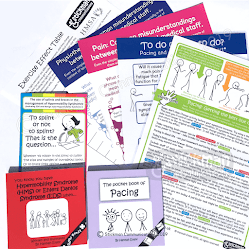If you are newly diagnosed with an illness here is some advice I would like to offer you.
Sometimes getting a new diagnosis can be a bit of a shock and it can be difficult to get your head around it. Other times you feel that 'click' moment where everything makes senses or because you've been trying to get that diagnosis confirmed for some time. Or you may feel like a weight has been lifted after not knowing what has been causing your 'medically unexplained' symptoms for so long. Whatever you feel - grief, fear, denial, happiness, hopeful, surprised - your feels are valid and there is no right or wrong way to feel.
Sometimes you may have already done some research into what illness you could possibly have before actually seeing a doctor, or you may have had some test results in the lead up to your diagnosis that my hint as to what illness you may have. Other times you can receive a diagnosis that you've never heard of before.
Here is some of my advice to you...
Ask your doctor and take notes
When you receive a diagnosis it's important to understand it. Make the most of your time with your doctor to ask questions such as what treatments are available, are there any lifestyle changes you can make, are there any referrals they can make to pass your case onto such as a specialist nurse that can oversee your care needs and to offer support. There may be some more specific questions directed towards particular illnesses, for example is this an illness that is temporary, relapsing and remitting/fluctuating or degenerative - some of these things may be difficult for your doctor to answer at first. You may want to know how or why you have this illness, such as is it genetic/hereditary? You may also want to understand how this illness works within your body - for example with me my FND is about the body's messaging system not working as it should.
Personally I find it important to take notes or if you have cognitive difficulties you can ask if you can record the appointment (usually this requires prior permission to do so). Notes can help as you can refer back to them or use them later if needed.
Also write down the name of the condition you have been diagnosed with especially if it has a name that is difficult to pronounce as you can show this to others when needed.
 Get information from reputable sources
Get information from reputable sources

It can be really easy to go on an internet search about your new diagnosis and find all sorts of information and sometimes certain sites aren't as credible as others.
My advice is to go to the credible sites, especially sites lead by organisations or charities that are there for people with a particular diagnosis. So for example with my HSD/hEDS diagnosis the sites that I'd go to for information would be the EDS Support UK, the EDS Society and the Hypermobility Syndromes Association (HMSA). Websites like this can give you information about the illness, symptoms management, living well and managing the illness, support for family and carers, current research, treatments etc.
Hannah Ensor, Chair of the Board of Trustees at the HMSA also has a whole host of well researched resources available Stickman Communications. Most charities and organisations will have information which you can access; I have a page here with a list of some organisations which you can check out (though this page isn't exhaustive; they only relate to my illnesses) but you can research online for charities and organisations that cover your illness and you doctor or nurse specialist may be able to point you in the direction of some organisations and charities that may be of help to you.
 Become a member
Become a member

Leading on from the previous section one of the biggest things I would suggest to someone newly diagnosed is to become a member of charities and organisations affiliated with your new diagnosis.
Becoming a member gives you access to a community of others with this illness, for example online forums, support groups for both individuals but also their family and carers. You may also get free information packs, or access to additional information sources such as webinars. You may also get access to their help/advice line and receive magazines or newsletters which give you information such as articles written by others with the condition or professionals working in that field, latest research and opportunities to participate in research, fundraising, what is being done to raise awareness and much more. Charities and organisations may also be putting campaigns on such as for M.E Awareness Month and they be asking member to help participate in the campaign. There may be access to other helpful things such as for example I'm a member of the Bladder and Bowel Community and I received a free 'Can't Wait' card which explains my urgent need to use a toilet and their home delivery service.
I'm a member of quite a few charities and organisations and I can't express enough how being a member of different charities and organisations has helped me live with and manage my illness as well as connect with others, participate in some of their work they do, write articles for their magazine and much more.

